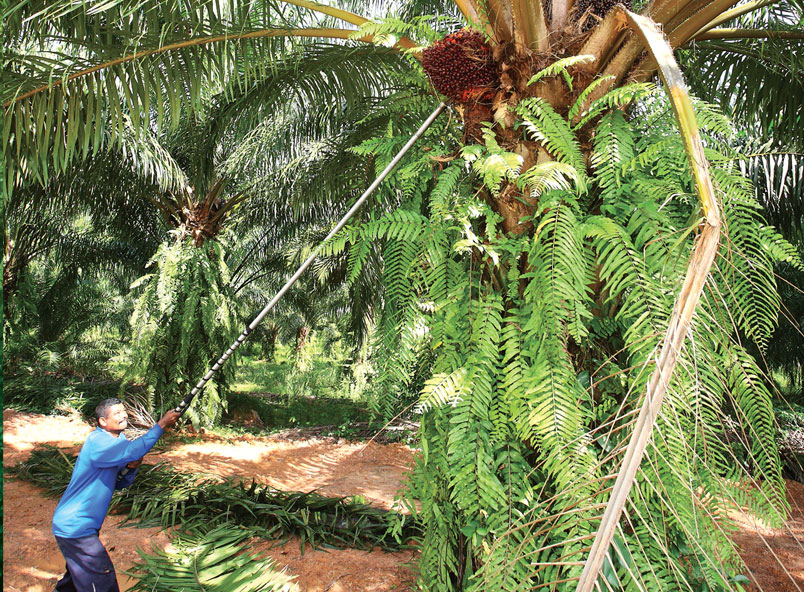



For oil palm smallholders in Indonesia
December, 2020 in Issue 4 - 2020, Sustainability
Three leading companies in the palm oil industry – Kao Corporation, Apical Group and Asian Agri – have launched a sustainability initiative to help independent oil palm smallholders in Indonesia to improve yields, acquire international certification and eventually secure sales premiums from selling certified palm oil.

Known as the ‘SMallholder Inclusion for better Livelihood & Empowerment’ programme – or SMILE – the collaboration is between downstream producer Kao Corporation, mid-stream processor, exporter and trader Apical Group, and upstream producer Asian Agri. The 11-year initiative seeks to continue building a more sustainable palm oil value chain by working with independent smallholders, who contribute more than 28% to Indonesia’s palm oil market.
The collaboration recognises that independent smallholders are private business owners who are challenged to increase their yield and productivity, but may not have the knowledge or the technical expertise to do so.
Global production of palm oil stands at 75 million tonnes per year and is expected to grow to 111.3 million tonnes by 2025. There is now a greater focus in Indonesia on improving palm oil productivity while minimising the need to extend agricultural land. This not only helps to safeguard food security, but serves to balance social, environmental and economic needs.
Kao Corporation, Apical Group and Asian Agri are implementing activities in accordance with the framework provided by the Roundtable on Sustainable Palm Oil (RSPO), and working to ensure traceability as far as the plantation, in order to build an environmentally-friendly, socially-aware supply chain.
While the palm oil industry has moved forward with national certification schemes such as Indonesian Sustainable Palm Oil or multi-stakeholder led collaborations like the RSPO, certification for independent smallholders has only recently gained momentum.
SMILE seeks to bridge the knowledge gap of independent smallholders by partnering with them and leveraging on the success that companies such as Asian Agri have demonstrated with its long-time partnerships with smallholders.
Implementing the programme
SMILE will assemble a team of experts with extensive experience in the areas of plantation management and agronomy to work with 5,000 independent smallholders that manage approximately 18,000 ha of plantations in the provinces of North Sumatra, Riau and Jambi. Through customised seminars and workshops, the team will:
This upscaling and provision of equipment will be implemented from 2020-30 with a view to helping independent smallholders secure RSPO certifications by 2030. Once certified, they will be eligible to receive certified palm oil premiums averaging 5% higher than non-certified palm oil.
As part of RSPO requirements as well as the companies’ commitment to help the community collectively realise the UN Sustainable Development Goals, SMILE includes initiatives that promote greater inclusion and improved livelihoods via empowerment initiatives for communities. The goal to improve the livelihood of independent smallholders will be through enhanced productivity with ‘no deforestation, no peat land and no exploitation’.
Throughout implementation, the three companies will regularly engage various stakeholders such as NGOs, non-profit organisations and community leaders. This is to ensure competent delivery of training, adequate allocation of equipment, and timely provision of needs at the estate and community levels. It will also optimise collaboration toward building a more sustainable and traceable supply chain.
Under the SMILE programme, Kao plans to provide farmers with its functional agrochemical adjuvant – which helps to boost productivity while also reducing the burden on the environment – along with technical guidance on how to use the product effectively.
It is also collaborating with NGOs and local non-profit organisations to implement surveys and analysis of the effectiveness of the support being provided with regard to boosting productivity and improving the smallholders’ working environment.
Apical Group is one of the largest exporters of palm oil in Indonesia, owning and controlling an extensive spectrum of the palm oil business value chain from sourcing to distribution. It also engages in the refining, processing and trading of palm oil for both domestic use and international export.
The Group promotes the protection of high conservation value and high carbon stock areas. Since 2017, it has been a partner of Tropical Forest Alliance 2020, a global public-private partnership that brings together governments, the private sector and civil society organisations to reduce deforestation associated with the sourcing of commodities such as palm oil, beef, soybean and pulp and paper.
Asian Agri is one of Indonesia’s largest palm oil producers. A pioneer of the Trans-National Government Migration programme, it currently works with 30,000 Plasma Scheme smallholders in Riau and Jambi who operate 60,000 ha of oil palm plantations, and independent smallholders who manage a total of 41,000 ha.
It has implemented a strict ‘no burn’ policy since 1994 as well as best practices in sustainable plantation management. Asian Agri has helped its smallholder partners improve productivity, yield and supply chain traceability, while assisting them to obtain certification.
Apical Group
Jakarta, Indonesia
This is an edited version of a press release issued on Oct 15, 2020.